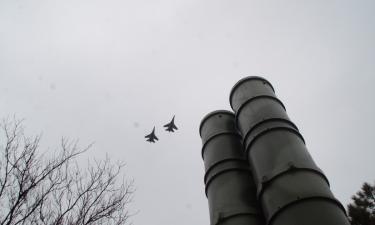America's Iranian Policy And Russia's Interests
The contradictions between Russia and the U.S. on Iraq are not so sharp already, but the Iranian question is likely to take their place.
According to National Security Advisor Condoleezza Rice, U.S. President Bush plans to continue discussing the Iranian problem with his Russian counterpart Vladimir Putin. It will also be on the agenda of the G-8 Evian summit, where Rice said Bush would discuss the steps that "can be taken to make certain that any efforts in which anyone is engaged in with Iran [...] are not actually contributing to the potential problem of a military nuclear program in Iran." The old discussion about Iran is changing its nature in the new geopolitical situation.
This is clear from the words of William Kristol, editor of the conservative Weekly Standard, who wrote in one of the latest issues of his magazine: "The liberation of Iraq was the first great battle for the future of the Middle East. [...] But the next great battle - not, we hope, a military battle - will be for Iran. We are already in a death struggle with Iran over the future of Iraq." Prior to the war on Iraq, Washington promised Iran via intermediaries that it would not suffer the fate of its neighbour. Tehran observed neutrality and was quite reserved with regard to the U.S. However, the Iraq war is officially ended and Tehran cannot stay aside from the post-war settlement. General Director of the Centre of Contemporary Iranian Studies Rajab Safarov says that "new government in Baghdad will anyway be pro-Iranian," because of Iraq's Shiite majority (whereas most Iranians are also Shiites, followers of one of the two major Islamic religious schools). The American administration realises that it will not achieve stability in Iraq (and also in Afghanistan, where the Iranian influence is significant) without gaining control over Tehran.
There are other reasons why the U.S. is trying to establish control over Tehran.
First, Washington did not put up with losing its positions in Iran following the 1979 Islamic revolution. In 1977, Washington and Tehran signed a $24 billion-worth contract, which provided for the U.S. constructing 8 nuclear power plants in Iran within 10 years. Armaments worth $14 billion were to be supplied. The U.S. military enjoyed diplomatic immunity in Iran and any political decisions taken by Iran were agreed on with the U.S. Even now, with the absence of official contracts, the U.S.-Iranian turnover is around $1 billion. By way of comparison, the trade turnover of Russia and Iran, two strategic partners, was $803 million in 2002.
A war for Iran's market is taking place. Washington is unwilling to let Russia or Europe there. It was under the U.S. pressure that the European Union did not sign the programme of trade and economic co-operation with Iran. This is basically the background of the current U.S. claims to Russia with regard to Russo-Iranian co-operation in the nuclear energy sphere.
Second, Iran is a crossroads on the strategic ways between Europe and Asia. The North-South transport corridor opened last year and connecting India to Russia and west Europe via the Caspian basin runs across Iran. Large-scale transit of energy resources is carried out via Iran. Russia and Iran have plans of transit of their electric energy to third countries. They also plan to unify their electric systems via Armenia and Azerbaijan. At last, Iran's gas resources are the world's largest (after Russia). Its geopolitical role in the Caspian region is also evident.
It is clear that breaking status quo in Iran will change the entire situation in the Caspian region, Central Asia and the North Caucasus and will directly affect Russia's interests.
Therefore, the issue of Russo-Iranian partnership should not be confined to nuclear co-operation (and, in particular, the completion of the Bushehr nuclear power plant first energy bloc), as America is trying to do.
Moscow is interested in maintaining stability in Iran and the whole region. According to Russian Foreign Minister Igor Ivanov, "Russia hopes that the U.S. claims to Iran will not lead to a conflict like that in Iraq."
Marianna Belenkaya, RIAN
Subscribe to Pravda.Ru Telegram channel, Facebook, RSS!





